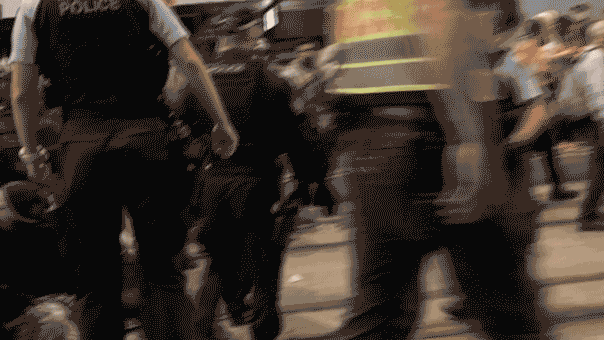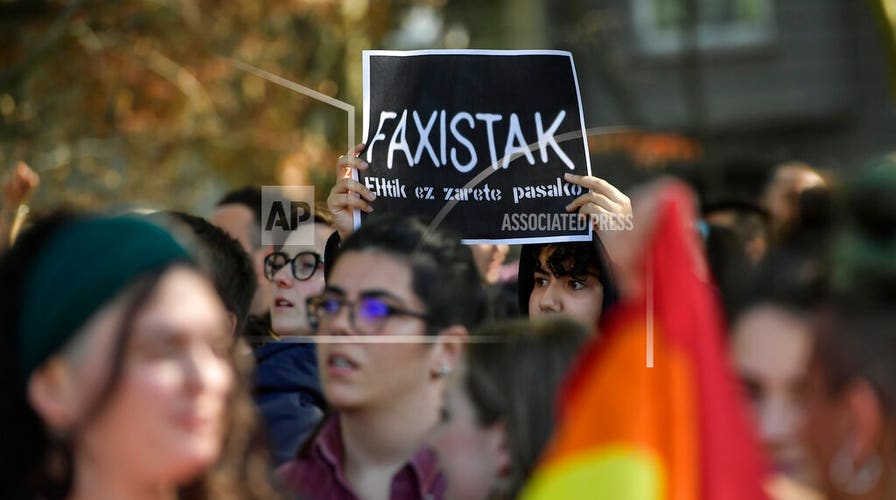Fox News Flash top headlines for April 23
Fox News Flash top headlines for April 23 are here. Check out what's clicking on Foxnews.com
An emerging far-right Spanish political group is rallying their supporters ahead of upcoming elections this month by tapping into the country's Civil War.
On April 28th, Spaniards will head to the polls and thousands are prepared to vote for the Vox Party, which has advocated for preserving the legacy of Francisco Franco.
The Franco regime remains a contentious issue for Spain and while many have advocated for reparations from the Civil War that killed and imprisoned hundreds of thousands, Vox wants to move on without a government-funded apology. It also runs counter to the ruling Socialists, who have pledged to remove Franco's remains from a mausoleum near Madrid.
After winning 12 seats in regional elections in Andalusia in December, sending shockwaves through Spain, the party, which campaigns on an anti-immigration message, now has its eye on national seats. Recent polling has predicted they will win anywhere from 29 to 37 seats in the 350-seat parliament, making them the first far-Right party to gain a foothold in national politics since Spain returned to democracy in 1975 upon Franco's death.
“For us, we only have one doctrine for the recent historical memory. And that is liberty: liberty for you to respect your grandparents,” Vox party leader, Santiago Abascal, told supporters during a rally. “How are we to condemn our grandparents?”
FORMER MARINE ARRESTED IN RAID AT NORTH KOREAN EMBASSY IN SPAIN

In this April 10, 2019 photo, farmers attend a meeting with Spanish far right party Vox at a bar in Brazatortas, on the edge of the Alcudia valley, central Spain. The April 28 election also comes as Spain's traditional bipartisan politics have crumbled into five main contenders, spurring the race for votes in the overrepresented hinterland, where nearly one third of seats in the parliament's lower house are up for grabs. (AP)
For one grandchild, the Vox Party is a reminder that the repercussions of the Civil War are still being dug up.
In 2007, the left-wing Socialist Workers’ party was able to pass the Historical Memory Law allowing government-funded archeological digs into Franco-created mass graves, as well as a number of rights and aid to victims and their families.
Daniel Galán has been a benefactor to this law, and he believes the exhumation of his grandfather, village Mayor Miguel Galán, has given him closure as well as an opportunity to pay proper respect to his ancestor who vanished over 80 years ago.

In this photo, provided by Radio Television Espanola, the four main candidates pose before a live televised general election debate in the RTVE studios in Madrid, Spain, Monday, April 22, 2019. The debate is the first of two televised debates after Spain's electoral board barred the far-right Vox party from participating because it has no presence in the country's parliament. (RTVE via AP)
“For those who say we are only reopening old wounds, that is not true, because those wounds have been open for 80 years,” Galán told the AP. “The difference is between them lying in mass graves like rotting dogs and being able to take them and give them a dignified burial.”
Miguel Galán is one of an estimated 114,000 bodies who remain hidden below the Spanish terrain in mass graves created by the Franco regime.
CLICK HERE FOR THE FOX NEWS APP
"The difference is between them lying in mass graves like rotting dogs and being able to take them and give them dignified burial," Galán said. "For those who say we are only reopening old wounds, that is not true, because these wounds have been open for 80 years."
For others, digging up bodies stirs up Spain's painful past. Some also fear exhumations could lead to shaming those who had relatives on the side of Franco*s right-wing forces.
"I think that that period of history was settled," Elena Escribano, a 60-year-old housewife, said at a recent Vox rally. "Not knowing where a relative is is hard, but there are victims on both sides. We must pray for them but we must look to the future."
The Associated Press contributed to this report.









































